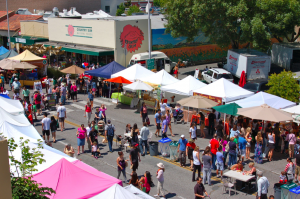
Ithaka co-op in Palo Alto is a group of 17 Stanford undergrads, grads and recent alumni who live together, pitch in for food and share house jobs, including cooking daily communal dinners. The residents have a policy of not serving meat; and they do not allow this fare to be cooked in their primary kitchen. But, while most individuals within the group consider the meat-free practices a good thing, only a minority of them actually deem themselves true vegetarians.
Many of those who live in Ithaka (I’m one of them) are part of the growing trend of “flexitarianism.” It’s a term used to describe the practice of reducing the consumption of meat without completely embracing vegetarianism.
As Stanford nutritionist Christopher Gardner said, “There are so many different angles,” to explain why someone might try to reduce meat consumption. “There’s the nutritional angle, the animal rights, global warming, human rights.”
Studies show that, while increased meat consumption has become one of the markers of living in the developed world, we can lessen many of the negative effects associated with meat simply by eating less of it. Producing meat requires more energy, land and water resources than producing food for plant-based diets. Meat consumption is also associated with an increased risk of premature mortality due to cardiovascular disease and cancer.
“Flexitarianism” may still be waiting for its mainstream break, but the word is by no means new. “Flexitarian” was voted the “Most Useful word of 2003” by the American Dialect Society, and several books have come out in the past few years espousing the flexitarian approach, such as The Flexitarian Diet by Dawn Jackson Blatner. Flexitarianism has also been promoted by nutritionists at places like the Mayo Clinic as a way to achieve some of the health benefits of the vegetarian diet without completely giving meat up.
As Stanford student Jenny Rempel puts it, being flexitarian means making conscious decisions about what you eat in order to lessen your meal’s overall impact. “There are so many factors that come into play with food,” Rempel said. She cited whether or not ingredients are organic, local, or, in the case of meat, how humanely the animal was raised. Rempel said she primarily eats a vegetarian diet but allows herself to have “well-sourced” meat two to four times a month.
Gardner is a vegetarian who tries to veer closer to veganism, which takes vegetarianism a step further by cutting out eggs and dairy. He said he thinks flexitarianism could make previously polarizing food discussions palatable to a wider audience.
And if that audience becomes wide enough, it could have far reaching effects: For example, according to the Environmental Working Group, if everyone in the United States gave up meat or cheese for just one day a week, the greenhouse gas emission savings would be equivalent to taking 7.6 million cars off the road.
Gardner also explains that the practice of eating, or not eating, meat and animal products is really a continuum: There’s more of a difference between diets that include eating meat at every meal and those that may have room for an occasional hamburger or chicken breast than there is between the latter and pure vegetarianism.
“It’s absurd that you get rid of that last meal, and then suddenly you’re a vegetarian,” he said.
Rather than working hard to eliminate all meat, many flexitarians put the emphasis on ensuring that the meat they do eat comes from “sustainable” sources, such as grass-fed beef or free-range chicken, instead. Bob Blanchard of Old Creek Ranch — one of the few meat vendors who comes to the Sunday Palo Alto farmer’s market on California Avenue — specializes in raising sustainable meat sources.
Blanchard said that if everyone ate meat from such sources, they would inherently be eating a lot less meat because these sources require more land and effort to produce than meat that is raised industrially. As a result, the sustainable meat is more expensive.
Despite being positive for the environment and personal health, flexitarianism doesn’t address one of the vegetarians’ core arguments – that it’s morally unjustifiable to eat meat at all.
“I haven’t forced myself to grapple with the ethics of eating meat period,” Rempel admits. For now, she said she’s happy taking small steps with the flexibility flexitarianism provides.
Editor’s Note: This story was updated on June 1 citing and linking to additional studies.
